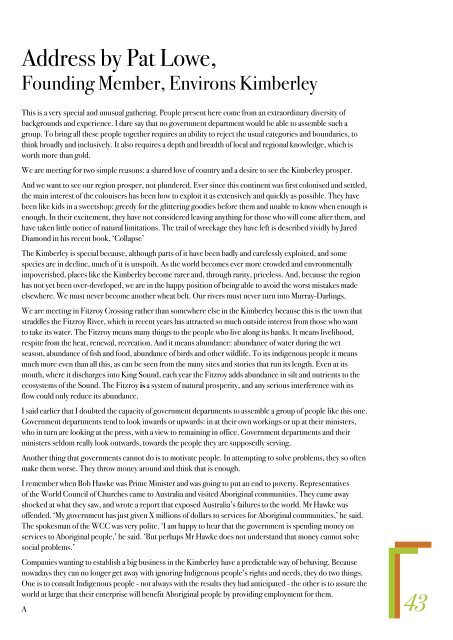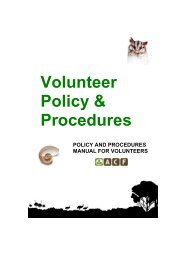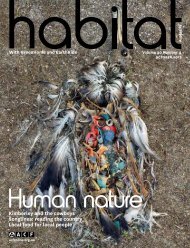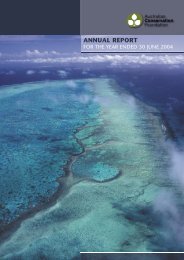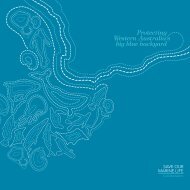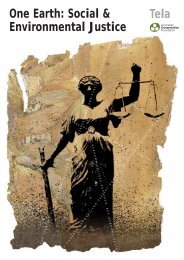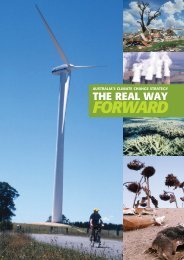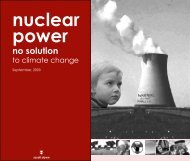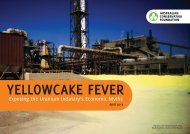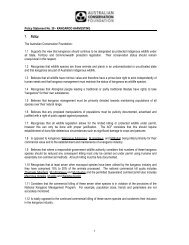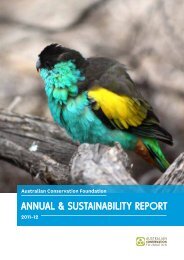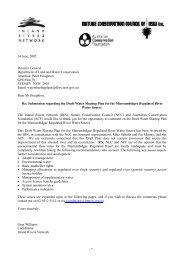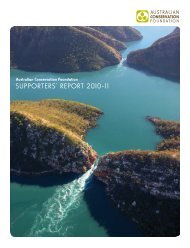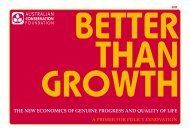Kimberley Appropriate Economics Interim Report - Australian ...
Kimberley Appropriate Economics Interim Report - Australian ...
Kimberley Appropriate Economics Interim Report - Australian ...
Create successful ePaper yourself
Turn your PDF publications into a flip-book with our unique Google optimized e-Paper software.
Address by Pat Lowe,<br />
Founding Member, Environs <strong>Kimberley</strong><br />
This is a very special and unusual gathering. People present here come from an extraordinary diversity of<br />
backgrounds and experience. I dare say that no government department would be able to assemble such a<br />
group. To bring all these people together requires an ability to reject the usual categories and boundaries, to<br />
think broadly and inclusively. It also requires a depth and breadth of local and regional knowledge, which is<br />
worth more than gold.<br />
We are meeting for two simple reasons: a shared love of country and a desire to see the <strong>Kimberley</strong> prosper.<br />
And we want to see our region prosper, not plundered. Ever since this continent was first colonised and settled,<br />
the main interest of the colonisers has been how to exploit it as extensively and quickly as possible. They have<br />
been like kids in a sweetshop: greedy for the glittering goodies before them and unable to know when enough is<br />
enough. In their excitement, they have not considered leaving anything for those who will come after them, and<br />
have taken little notice of natural limitations. The trail of wreckage they have left is described vividly by Jared<br />
Diamond in his recent book, ‘Collapse’<br />
The <strong>Kimberley</strong> is special because, although parts of it have been badly and carelessly exploited, and some<br />
species are in decline, much of it is unspoilt. As the world becomes ever more crowded and envronmentally<br />
impoverished, places like the <strong>Kimberley</strong> become rarer and, through rarity, priceless. And, because the region<br />
has not yet been over-developed, we are in the happy position of being able to avoid the worst mistakes made<br />
elsewhere. We must never become another wheat belt. Our rivers must never turn into Murray-Darlings.<br />
We are meeting in Fitzroy Crossing rather than somewhere else in the <strong>Kimberley</strong> because this is the town that<br />
straddles the Fitzroy River, which in recent years has attracted so much outside interest from those who want<br />
to take its water. The Fitzroy means many things to the people who live along its banks. It means livelihood,<br />
respite from the heat, renewal, recreation. And it means abundance: abundance of water during the wet<br />
season, abundance of fish and food, abundance of birds and other wildlife. To its indigenous people it means<br />
much more even than all this, as can be seen from the many sites and stories that run its length. Even at its<br />
mouth, where it discharges into King Sound, each year the Fitzroy adds abundance in silt and nutrients to the<br />
ecosystems of the Sound. The Fitzroy is a system of natural prosperity, and any serious interference with its<br />
flow could only reduce its abundance.<br />
I said earlier that I doubted the capacity of government departments to assemble a group of people like this one.<br />
Government departments tend to look inwards or upwards: in at their own workings or up at their ministers,<br />
who in turn are looking at the press, with a view to remaining in office. Government departments and their<br />
ministers seldom really look outwards, towards the people they are supposedly serving.<br />
Another thing that governments cannot do is to motivate people. In attempting to solve problems, they so often<br />
make them worse. They throw money around and think that is enough.<br />
I remember when Bob Hawke was Prime Minister and was going to put an end to poverty. Representatives<br />
of the World Council of Churches came to Australia and visited Aboriginal communities. They came away<br />
shocked at what they saw, and wrote a report that exposed Australia’s failures to the world. Mr Hawke was<br />
offended. ‘My government has just given X millions of dollars to services for Aboriginal communities,’ he said.<br />
The spokesman of the WCC was very polite. ‘I am happy to hear that the government is spending money on<br />
services to Aboriginal people,’ he said. ‘But perhaps Mr Hawke does not understand that money cannot solve<br />
social problems.’<br />
Companies wanting to establish a big business in the <strong>Kimberley</strong> have a predictable way of behaving. Because<br />
nowadays they can no longer get away with ignoring Indigenous people’s rights and needs, they do two things.<br />
One is to consult Indigenous people - not always with the results they had anticipated - the other is to assure the<br />
world at large that their enterprise will benefit Aboriginal people by providing employment for them.<br />
A<br />
43


